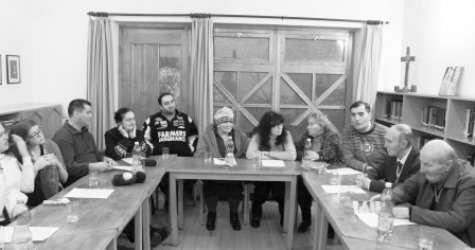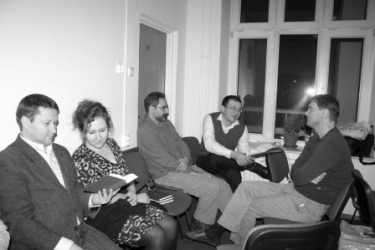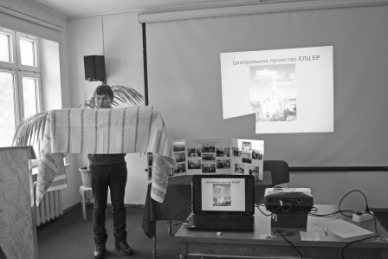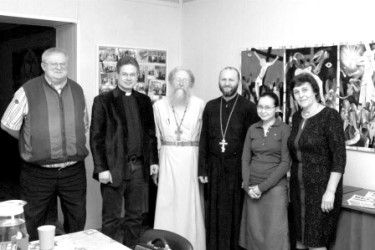|
|
February 2015Installation of Dietrich Brauer as Archbishop of the Evangelical Lutheran Church in Russia Moscow St. Peter and Paul's Cathedral in Moscow had never held such an event before; perhaps it was the largest event of its kind in the post-Soviet history of the Evangelical Lutheran Church in Russia – the consecration of Dietrich Brauer as Archbishop of ELCR on February 8, 2015. There were bishops from foreign churches, representatives of international church organizations, local representatives of churches, of the government and of foreign diplomatic missions (Germany and America). Image After two years as the “acting” Archbishop, the title was made official at the General Assembly of the Russian church in September 2014. It was decided then that it would be good to plan the installation as a large meeting of partners and friends of the church, so time was left to invite people and put together plans. In the end the installation was presided at by the Archbishop of the Evangelical Lutheran Church in Estonia Urmas Viilma, who himself had just become Archbishop in Tallinn the week before. Assisting him were representatives of the LWF, the churches in Hungary, Slovakia, Finland, Austria, Latvia, Siberia and Kazakhstan. Ecumenical guests from the Orthodox, Catholic and protestant churches also were in attendance. In his sermon Archbishop Brauer spoke about what he sees as priorities – the strengthening of internal church unity and of the structures of the Union of Evangelical Lutheran Churches. He sees the Lutheran church here playing a positive role in Russian society, in the ecumenical sphere and in the international Lutheran family.
The Unfinished Business of Ecumenism Tbilisi, Georgia The theme of the 2015 “Luther Days,” held February 10-16 in the Church of Reconciliation, was “The Reformation and Ecumenism.” The main presenter was Siegfried Kasparick, the Dean of Wittenburg, the city where Martin Luther lived and worked. Who else knows so much about the preparations for the 500th anniversary of the Reformation in 2017 as he does? And who else is so capable of explaining the significance of this event for the ecumenical world, that is, for other Christian churches? The 95 Thesis hung on the door of the Castle Church in Wittenburg on October 31, 1517, were not a call to split the church, but simply one of many attempts to renew the Church through returning it to its roots – to the Good News of Jesus Christ. The Lutheran church that arose as a result was called to witness to the this. One of the central events of the “Luther Days” was the round table discussion that took place with the participation of leaders of various religious confessions – a priest from the Armenian Apostolic Church, Narek Kushyan, the Bishop of the Evangelical Baptist Church Malkhaz Songulashvili, the Dean of the Roman Catholic University in Tbilisi Vazha Vardidze, Beka Mindiashvili – a representative of the Center of Tolerance, and Bishop Hans-Joachim Kiderlen. The Georgian Orthodox Church, unfortunately, did not accept the invitation that was extended to them. The whole discussion was led by Nino Lezhava, the director of the Heinrich Boell Foundation in Georgia. Two themes were repeated brought up during this long discussion - “Christian love” between Christian churches and “Christian responsibility” in society. Also ecumenism should be part of the lives of church members, of ordinary believers.
This time the annual reception that the ELCG organizes for representatives of the state, society and religious organizations was held as part of the program of the “Luther Days.” Dean Kasparick read a paper on the theme “The 500th anniversary of the Reformation from the viewpoint of the Churches.” The evening's entertainment was provided by a choir directed by Nataly Chaganava. Unfortunately there weren't as many people in attendance – from the ECLG, from other churches, from government and non-government organizations - as the church had planned. Yet the organizers of the Luther Days remain convinced that their work is not in vain; it has is bearing and will continue to bear good fruit.
Like a Large Canvas Moscow “The Unity of the Spirit in the Bond of Peace” - these words from Ephesian 4 were the theme for the second annual “Church Days of the ELCER,” held February 9-10, 2015, in the Moscow oblast at the “Dom Bosko” Roman Catholic retreat center. Representatives of the deaneries of the ELCER – pastors and active congregational members – gathered together for a day of fellowship; they told one another about what life is like throughout the church. Representatives of the deaneries took turnings giving short presentations about their congregations – through pictures it was obvious both how alike and how different the congregations are. One thing unites them all – an accent on diaconal work. Carrying for the elderly, for orphans or the disabled, for those who need pastoral care, for the homeless and for those who are HIV positive... while most of society is indifferent to such needs, that is not the case with Russian Lutherans. That is one thing that is obvious from the presentations given during the ELCER Church Day. It also remains clear that our church is like a large canvas made up of various pieces that can only fulfill their function by being together.
A number of congregations and their historical buildings celebrated special anniversaries this year – in Samara, Ulyanovsk, and Perm. Others are working on finding the resources to restore historic buildings or to build new ones; this is the priority of such congregations as Yaroslavl and Saratov. In Kazan the full restoration of the building has been completed...and few people know that there is a building of the Lutheran Church in Vladikavkaz! But right now it is used by the orchestra (as is the case in Archangelsk.) There are Lutheran congregations not only in the big cities, but also in villages, for example in the Samara, Saratov and Kaliningrad deaneries. It was news to many that a small, new congregation has now been founded in the Northwest deanery - in the village of Krestsy in the Novgorod region. For the first time, congregations from Crimea took part in the Church Day; the congregations in Simferopol and Yalta are now in the process of re-registration and will soon become official congregations of ELCER. The Crimeans introduced their congregations to the rest of the church and expressed a wish that friendly relationships with Russian church would develop quickly. Throughout the day representatives from the ELCER's new partner church, the Evangelical Lutheran Church in Saxony, were also present and took part. The day ended with Bible study and evening prayer led by pastors Viktor Weber (Moscow) and Elena Bondarenko (Moscow area Dean). The conclusion of the Church Day was worship the next morning, presided at by Archbishop Dietrich Brauer. The preacher was recently-ordained Andrey Dzhamgarov from Saratov.
Scripture Alone, Dialog Alone Abakan, Russia At the end of February for the first time the congregation in Abakan was visited by guests from the youth group of the local Russian Orthodox Church. In conversation after worship they shared their positive impressions and expressed their desire for further fellowship. The congregation members from the Lutheran side were also encouraged by this encounter and suggested that the contacts between the two confessions grow. That led to a meeting between the congregations leaders – two priests and a youth group leader from the Orthodox congregation and, on the Lutheran side, Pastor Dmitry Schweitz, Alexander Ertel (church council president in Abakan), and Zoya Heintz (preacher in Chernogorsk).The Orthodox guests suggested “sola Scriptura” as a theme for discussion, and Pastor Schweitz spoke about the Lutheran perspective on this Reformation principle, while the Orthodox representatives spoke about their position. Even after a couple of hours of dialog it became clear just how much there is to talk about. Such meetings give hope for the development of inter-confessional cooperation, which is so important in our secular society.
Walls to Protect or to Divide? Omsk “Let us go build a wall!” - this was the theme of the latest seminar for Christian men held on February 20-22 at the Admiral Makarov camp in the Omsk region. These seminars take as their theme one particular person from the Bible, and this time it was the prophet Nehemiah. Around 2400 years ago Nehemiah, who occupied a high-level government office in the court of the Persian king, asked to become the governor of the province of Judea and was granted permission to restore the city of Jerusalem. “”Let's go build a wall!,” he told his fellow countrymen. And they responded. Despite enormous difficulties – a huge need for resources, enemy attacks, treacherous friends and the burning sun – Jerusalem was restored. The wall that defended the holy city from its enemies was built in a record time – in 52 days! Nehemiah's work was a great success. How did that happen? The book of Nehemiah tells us...and it gives us guidance as to how we can attain our goals in life – that was what the seminar was about. A wall is that which, first and foremost, defends us, our families, our faith. A strong wall cannot be built alone, but only together...yet even unity among people is not enough: “Unless the LORD builds the house, its builders labor in vain.” Nehemiah inspires us to trust the Lord God in all our endeavors.
Walls also function in another way - they divide, not only cities and countries, not only people of various nations and faiths, but also people who had once been close to one another – spouses, parents, children... We build these walls ourselves and it is not easy to break them down. During the seminar participants also learned how the Word of God helps us to tear down the walls that divide us. The Scripture lessons were reinforced by time spent in fellowship, for example, through sports – the participants learned how to play rugby this time! There were many surprises throughout the seminar, but some things remained the same – wonderful weather, fresh air, friendly fellowship, well-organized events and the Lord's blessing. The latter will help all who participated build walls that protect and tear down walls that divide.
|

(1).jpg)
(1).jpg)
(1).jpg)
(1).jpg)
(1).jpg)




(9).jpg)